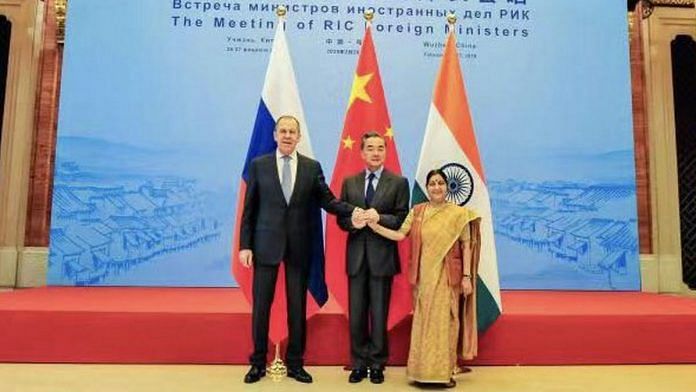Which China should India believe? On Wednesday morning, in what seemed to be music to India’s years, China’s Foreign Minister Wang Yi came down hard on sponsors of terrorism at the Russia-India-China foreign ministers’ meet in Wuzhen, Zhejiang.
External Affairs Minister Sushma Swaraj considered Wang’s comments significant enough to highlight them to the media, saying they showed “we would cooperate on eradicating the breeding grounds of terrorism”.
Wang had said that it was “especially important… to eradicate the breeding grounds of terrorism and extremism”, surely cognisant of how his remarks would have played in the one country widely acknowledged to be the biggest breeding ground, by far.
The RIC joint communique also expressed in strong terms a common strategy on terror, specifically mentioning United Nations Security Council (UNSC) resolutions and Financial Action Task Force (FATF) standards, and working to “extradite or prosecute”.
Yet by the time Wang was back in Beijing on Wednesday evening, he was on the phone to Pakistan’s Foreign Minister Shah Mahmood Qureshi. Sift the intentionally vague language of diplomatese and there appeared to be a tacit endorsement of Pakistan’s stand, when Wang told him that China believed that countries’ territorial sovereignty should be respected, as also the norms of international relations, in what appeared to be a reference to the Indian Air Force’s airstrikes in Balakot in response to the recent Pulwama attack on a CRPF convoy.
Also read: Two steps Narendra Modi govt can take to give Pakistan and China a tough message on Pulwama
Both comments, made on the same day, present a snapshot of the diplomatic balancing act that has been China’s trademark when dealing with India-Pakistan crises.
Pakistan is the country China likes to call its “irreplaceable all-weather” friend.
Yet this declaration hasn’t always translated into overt support during crises between India and Pakistan. A case in point is the Mumbai attacks of November 26, 2008, which, as has been the case during the recent flare-up in tensions, saw Beijing call for both sides to show restraint. A month after the 26/11 attacks, China even supported an application at the UNSC 1267 sanctions committee to designate Hafiz Saeed of the LeT as a terrorist, amid global outrage over the attacks.
This diplomatic balancing — or at least the pretence of balancing — has, no doubt, been accompanied by continued military and financial backing to Pakistan, a cornerstone of Beijing’s long-desired plan of trying to bring “parity” that would keep India tied down in its neighbourhood.
A decade on, even this balancing act has become increasingly unsustainable given the direction of China’s Pakistan policy under President Xi Jinping. The China Pakistan Economic Corridor (CPEC), a flagship of Xi’s Belt and Road Initiative, has made China more invested than ever before in Pakistan’s future.
For Beijing, this presents a dilemma. Its abiding desire is stability.
Also read: What China’s $26.5 billion investment for CPEC will cost Pakistan
War certainly isn’t going to help its investments in an already teetering economy, which is why Beijing has been working the phones, calling for restraint. Escalation isn’t in China’s interests.
Beijing, on the other hand, still remains firmly wedded to its reliance on Pakistan’s military-intelligence apparatus, not least to ensure the safety of the tens of thousands of Chinese workers in that country, besides the threat from Uighur separatists, some of whom have reportedly made their base in the Pakistan-Afghanistan border.
This is why Beijing has taken the questionable — some would say foolhardy — gamble of giving diplomatic cover to Pakistan when it comes to terror groups that are hand-in-glove with the state, as long as Beijing’s interests are protected. This, the Pakistan military has appeared to ensure, for instance by taking down East Turkestan Islamic Movement camps.
This also explains the considerable diplomatic effort Beijing has expended to veto three resolutions in 2009, 2016 and 2017 to protect Jaish-e-Mohammed chief Masood Azhar from being designated as a global terrorist — regardless of the enormous cost not only to Beijing’s image but to its relations with India.
Also read: Beijing’s calculus on Masood Azhar goes through the China-Pakistan corridor
With the US, France and the UK moving the fourth application Wednesday to list Azhar, who claimed responsibility for the Pulwama attack, it remains to be seen if Beijing will follow the example of 2008, when it didn’t stop Saeed from being listed.
What’s different, this time around, is a China that not only has greater stakes in Pakistan but also, under Xi, appears less concerned about the prospect of being diplomatically isolated — even on the clear-cut matter of designating a terrorist.
The author is a Visiting Fellow at Brookings India and was formerly China correspondent for India Today and The Hindu.




When EAM Sushma Swaraj meets Chinese FM Wang Yi, there are other useful topics that could be discussed. How can India export more to China, reducing the trade deficit. The possibility of China making large, long term investments in the Indian economy, led by infrastructure. Increasing strategic trust, in order that incidents like Dokalam are avoided.